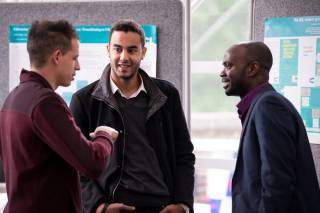How you could get involved in the Eugenics Legacy Education Project (ELEP) and engage with difficult knowledge.
What is the ELEP?
ELEP is a three-year project (2022-2025) designed to ensure learning about UCL’s eugenics legacy is embedded across the university, a key recommendation of The Inquiry into the History of Eugenics at UCL. The project also aims to work with people to develop our teaching of ‘difficult’ knowledge beyond eugenics.
How can staff and students get involved?
The project team are looking to work with students and staff, especially those from backgrounds affected by eugenic beliefs and policies, to increase and diversify teaching about eugenics and UCL’s role in eugenics and help build resources to support the teaching of areas of ‘difficult’ knowledge.
We’d like to work with people who are:
- Passionate about education and social justice.
- Interested in developing innovative and inclusive ways to address problematic histories in higher education.
- Want to lead on innovative teaching and learning approaches across UCL and influence curriculum development.
Why is the theme of UCL's eugenics legacy a priority?
From a purely educational perspective, an inclusive curriculum benefits and enriches all students. One aspect of that may be to address troubling histories and legacies such as eugenics at UCL. An inclusive curriculum aims to improve the experience, skills and attainment of all students, including those in protected characteristic groups, by ensuring that all students, regardless of background, are able to participate fully and achieve at equal rates. UCL is committed to eliminated the small but statistically significant discrepancy in the rate of good degrees achieved by Black, Asian and minority ethnic (BAME) students compared with white students, despite entering UCL with the same high entry qualifications. A lot of this activity is taken forward through the BAME Awarding Gap project, whom ChangeMakers works with closely.
Suggested activities
ELEP ChangeMakers projects should encourage engagement with core issues in justice sensitive approaches to education, such as difficult knowledge (Britzman, 1998), affective solidarity (Hemmings, 2012), counter storytelling (Bell, 1987), education and harm (Love, 2019), inclusive education (Morina, 2017), and productive pedagogies (Zembylas, 2022).
UCL’s eugenics legacy is a starting point for reflecting on our encounters with difficult knowledge in the curriculum and thinking carefully about our positionalities as educators and as learners. We’re open to hearing a variety of ideas for ChangeMakers projects that build on this theme.
Activities could include:
- Developing a session to explore the legacies* of eugenics for disabled people in your discipline.
- Hosting a podcast episode(s).
- Multimodal guide for teaching difficult knowledge in your discipline.
- An object-based learning teaching resource.
- Events programme for healing and hearing.
- Piloting ‘Welcome Events’ for new staff or new students on the eugenics legacy at UCL.
- Video resources for lecturers on having ‘difficult conversations’
*Legacies rather than legacy because it is not simply a case of reflecting on the legacy Galton (who never worked at UCL) and Pearson (whose names have been removed from the UCL estate). Instead, eugenics appears in many guises and in many places in the curriculum beyond genetics (education, economics, arts, and language studies etc).
More ideas to get you started
- What’s in a name? Exploring the role of de-naming and re-naming in reparative education practices
Overview: a small team of students could work with other institutions to explore the importance of de-naming and re-naming. Working with expertise to support workshop activities, the project would offer next steps/further steps in moving towards the removal of names associated with eugenics past.
- Resistance and Reparation at UCL – student scholarship and change
Overview: student teams working with ELEP and Prejudice in Power (PiP) could produce educational resources and scholarship that will be used in teaching toolkits. Focusing on the histories of those that opposed eugenics globally, this project offers an opportunity for student to use alternative methods of representation to reflect their scholarship – for example, zine making, Tik Toks, hip hop pedagogies, craftivism, graffiti and street art. Also it would be an opportunity to tell UCL’s story of reckoning with eugenics in different ways.
- Who’s missing?
Overview: students and staff could look at the missing voices from UCL’s eugenics reckoning and look to devise recordings of these histories. Utilising digital storytelling as the main method of representing these stories, this project could offer an opportunity for multimodal and interactive engagement with everyone who has a stake in the story of the next 100 years at UCL.
- What counts? Who counts?
Overview: Francis Galton was obsessed with counting and believed it to be vital for human betterment. This project would provide a counter story – a campaign designed to be shared in Summer 2024 (tbc) to prompt critical questions about the ongoing questions of eugenics discourses across disciplines. Arts based approaches, workshops and creative collaboration (such as an artist in residence) could be used to ask what should count at UCL if we are to be a thriving and diverse community for the next 100 years?
References
- Bell, D. (1987) And we are not saved: The elusive quest for racial justice. New York. Basic Books.
- Britzman, D. P. 1998. Lost Subjects, Contested Objects: Toward a Psychoanalytic Inquiry of Learning. Albany, NY: SUNY Press.
- Davies, L. (2017) Justice-sensitive education: the implications of transitional justice mechanisms for teaching and learning, Comparative Education, 53:3, 333-350, DOI: 10.1080/03050068.2017.1317999
- Hemmings, C. (2012). Affective solidarity: Feminist reflexivity and political transformation. Feminist Theory, 13(2), 147–161. https://doi.org/10.1177/1464700112442643
- Love, B. (2019) We want to do more than survive: Abolitionist Teaching and the Pursuit of Educational Freedom. Boston. Beacon Press.
- Moriña, A. (2017) Inclusive education in higher education: challenges and opportunities, European Journal of Special Needs Education, 32:1, 3-17, DOI: 10.1080/08856257.2016.1254964
- Rothberg, M. (2019) The implicated subject: beyond victims and perpetrators. Stanford. Stanford University Press.
- Zembylas, M. (2022) Ethics, politics and affects: renewing the conceptual and pedagogical framework of addressing fanaticism in education. Ethics and Education 17:3, pages 261-276.
 Close
Close


